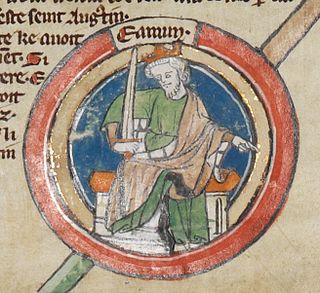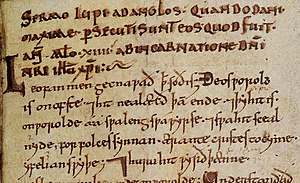Ælfheah, more commonly known today as Alphege, was an Anglo-Saxon Bishop of Winchester, later Archbishop of Canterbury. He became an anchorite before being elected abbot of Bath Abbey. His reputation for piety and sanctity led to his promotion to the episcopate and, eventually, to his becoming archbishop. Ælfheah furthered the cult of Dunstan and also encouraged learning. He was captured by Viking raiders in 1011 during the siege of Canterbury and killed by them the following year after refusing to allow himself to be ransomed. Ælfheah was canonised as a saint in 1078. Thomas Becket, a later Archbishop of Canterbury, prayed to Ælfheah just before his murder in Canterbury Cathedral in 1170.

Æthelred II, known as Æthelred the Unready, was King of the English from 978 to 1013 and again from 1014 until his death in 1016. His epithet comes from the Old English word unræd meaning "poorly advised"; it is a pun on his name, which means "well advised".

Edmund I or Eadmund I was King of the English from 27 October 939 until his death in 946. He was the elder son of King Edward the Elder and his third wife, Queen Eadgifu, and a grandson of King Alfred the Great. After Edward died in 924, he was succeeded by his eldest son, Edmund's half-brother Æthelstan. Edmund was crowned after Æthelstan died childless in 939. He had two sons, Eadwig and Edgar, by his first wife Ælfgifu, and none by his second wife Æthelflæd. His sons were young children when he was killed in a brawl with an outlaw at Pucklechurch in Gloucestershire, and he was succeeded by his younger brother Eadred, who died in 955 and was followed by Edmund's sons in succession.

Year in topic Year 1014 (MXIV) was a common year starting on Friday of the Julian calendar, the 1014th in topic the 1014th year of the Common Era (CE) and Anno Domini (AD) designations, the 14th year of the 2nd millennium, the 14th year of the 11th century, and the 5th year of the 1010s decade.

The witan was the king's council in the Anglo-Saxon government of England from before the 7th century until the 11th century. It comprised important noblemen, including ealdormen, thegns, and bishops. Meetings of the witan were sometimes called the witenagemot.

Æthelred I was King of Wessex from 865 until his death in 871. He was the fourth of five sons of King Æthelwulf of Wessex, four of whom in turn became king. Æthelred succeeded his elder brother Æthelberht and was followed by his youngest brother, Alfred the Great. Æthelred had two sons, Æthelhelm and Æthelwold, who were passed over for the kingship on their father's death because they were still infants. Alfred was succeeded by his son, Edward the Elder, and Æthelwold unsuccessfully disputed the throne with him.

Edward the Martyr was King of the English from 8 July 975 until he was killed in 978. He was the eldest son of King Edgar. On Edgar's death, the succession to the throne was contested between Edward's supporters and those of his younger half-brother, the future King Æthelred the Unready. As they were both children, it is unlikely that they played an active role in the dispute, which was probably between rival family alliances. Edward's principal supporters were Dunstan, Archbishop of Canterbury, and Æthelwine, Ealdorman of East Anglia, while Æthelred was backed by his mother, Queen Ælfthryth and her friend Æthelwold, Bishop of Winchester. The dispute was quickly settled. Edward was chosen as king and Æthelred received the lands traditionally allocated to the king's eldest son in compensation.

Edgar was King of the English from 959 until his death in 975. He became king of all England on his brother's death. He was the younger son of King Edmund I and his first wife Ælfgifu. A detailed account of Edgar's reign is not possible, because only a few events were recorded by chroniclers and monastic writers were more interested in recording the activities of the leaders of the church.

Eadred was King of the English from 26 May 946 until his death in 955. He was the younger son of Edward the Elder and his third wife Eadgifu, and a grandson of Alfred the Great. His elder brother, Edmund, was killed trying to protect his seneschal from an attack by a violent thief. Edmund's two sons, Eadwig and Edgar, were then young children, so Eadred became king. He suffered from ill health in the last years of his life and he died at the age of a little over thirty, having never married. He was succeeded successively by his nephews, Eadwig and Edgar.
Lyfing was an Anglo-Saxon Bishop of Wells and Archbishop of Canterbury. He was abbot of Chertsey Abbey before becoming bishop at Wells. His appointment to Canterbury came at a time of Danish invasions of England, and he was unable to act as archbishop for a time due to Danish activity. When Cnut, the Danish king, became king of England, Lyfing likely consecrated the new king. Lyfing was known as a wise man and gave gifts to his church and oversaw repairs to his cathedral before his death in 1020.
Ælfric of Eynsham was an English abbot and a student of Æthelwold of Winchester, and a consummate, prolific writer in Old English of hagiography, homilies, biblical commentaries, and other genres. He is also known variously as Ælfric the Grammarian, Ælfric of Cerne, and Ælfric the Homilist. In the view of Peter Hunter Blair, he was "a man comparable both in the quantity of his writings and in the quality of his mind even with Bede himself." According to Claudio Leonardi, he "represented the highest pinnacle of Benedictine reform and Anglo-Saxon literature".
Wulfstan was Archbishop of York between 931 and 952. He is often known as Wulfstan I, to separate him from Wulfstan II, Archbishop of York.
Wulfstan was an English Bishop of London, Bishop of Worcester, and Archbishop of York. He is thought to have begun his ecclesiastical career as a Benedictine monk. He became the Bishop of London in 996. In 1002 he was elected simultaneously to the diocese of Worcester and the archdiocese of York, holding both in plurality until 1016, when he relinquished Worcester; he remained archbishop of York until his death. It was perhaps while he was at London that he first became well known as a writer of sermons, or homilies, on the topic of Antichrist. In 1014, as archbishop, he wrote his most famous work, a homily which he titled the Sermo Lupi ad Anglos, or the Sermon of the Wolf to the English.
Sigeric was the Archbishop of Canterbury from 990 to 994. Educated at Glastonbury Abbey, he became a monk there before becoming an abbot and then Bishop of Ramsbury before his elevation to the archbishopric. An account of his pilgrimage to Rome in 990 survives and is an important source for historians studying Rome during his lifetime.

Æthelwold of Winchester was Bishop of Winchester from 963 to 984 and one of the leaders of the tenth-century monastic reform movement in Anglo-Saxon England.
The First Battle of Alton was a skirmish in 1001 between the English and the Vikings. According to the Anglo-Saxon Chronicle it took place at somewhere called, in Old English, Æthelingadene. Traditionally, the site was believed to have been what is now Alton, Hampshire. However, it is thought more likely to have been in the East and West Dean area of modern-day West Sussex.
Events from the 1010s in England.
Events from the 1000s in England.
Geþyncðo, meaning “Dignities”, is the title given to an Old English legal tract on status and social mobility, probably written by Wulfstan (II), Archbishop of York between 1002 and 1023. It is sometimes known as one of the so-called 'promotion laws', along with Norðlleoda laga, and both these texts belong to a legal compilation on status, dubbed ‘the Geþyncðu group’ by the historian Patrick Wormald. Though the extent to which these reflect reality is a topic of some debate, they constitute one of the most valuable primary documents for an understanding of social status in late Anglo-Saxon England.









